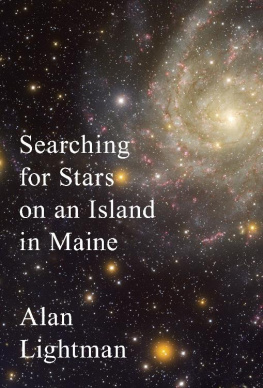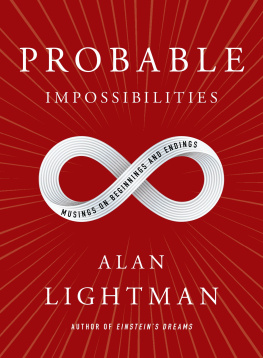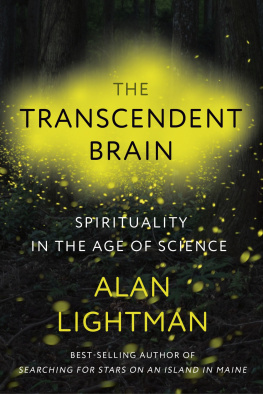Alan Lightman - Searching for Stars on an Island in Maine
Here you can read online Alan Lightman - Searching for Stars on an Island in Maine full text of the book (entire story) in english for free. Download pdf and epub, get meaning, cover and reviews about this ebook. year: 2018, publisher: Knopf Doubleday Publishing Group, genre: Science fiction. Description of the work, (preface) as well as reviews are available. Best literature library LitArk.com created for fans of good reading and offers a wide selection of genres:
Romance novel
Science fiction
Adventure
Detective
Science
History
Home and family
Prose
Art
Politics
Computer
Non-fiction
Religion
Business
Children
Humor
Choose a favorite category and find really read worthwhile books. Enjoy immersion in the world of imagination, feel the emotions of the characters or learn something new for yourself, make an fascinating discovery.
- Book:Searching for Stars on an Island in Maine
- Author:
- Publisher:Knopf Doubleday Publishing Group
- Genre:
- Year:2018
- Rating:4 / 5
- Favourites:Add to favourites
- Your mark:
- 80
- 1
- 2
- 3
- 4
- 5
Searching for Stars on an Island in Maine: summary, description and annotation
We offer to read an annotation, description, summary or preface (depends on what the author of the book "Searching for Stars on an Island in Maine" wrote himself). If you haven't found the necessary information about the book — write in the comments, we will try to find it.
Searching for Stars on an Island in Maine — read online for free the complete book (whole text) full work
Below is the text of the book, divided by pages. System saving the place of the last page read, allows you to conveniently read the book "Searching for Stars on an Island in Maine" online for free, without having to search again every time where you left off. Put a bookmark, and you can go to the page where you finished reading at any time.
Font size:
Interval:
Bookmark:
I am pleased to acknowledge many people who helped me with this book. For conversations on spiritual matters, I thank Rabbi Micah Greenstein, the Venerable Yos Hut Khemacaro, Rabbi Sandy Sasso, Rabbi Dennis Sasso, and Owen Gingerich. For scientific conversations, I thank Don Page, Sean Carroll, Alex Vilenkin, Alan Guth, and Robert Jaffe. For matters in the history of science, I thank Owen Gingerich. For philosophical conversations, I thank Ned Hall and Jeff Wieand. For conversations on psychology and mind, I thank Nick Browning and Ross Peterson. Many others have shaped me in ways big and small.
I thank my literary agents and counselors Jane Gelfman and Deborah Schneider for their steady and loving trust in me over so many years. I thank my longtime and wonderful editor at Pantheon, Dan Frank, who has the rare courage to follow his own judgment instead of the market, who says what he likes and what he doesnt, and who has often pushed me to do better.
Finally, I thank my dear wife, Jean, my loving companion through this fleeting life, and my daughters, Kara and Elyse, who have made me proud and give me hope for the future.
Screening Room
The Accidental Universe
Mr g
Ghost
The Discoveries
A Sense of the Mysterious
Reunion
The Diagnosis
Dance for Two
Good Benito
Song of Two Worlds
Einsteins Dreams
Alan Lightmanwho worked for two decades as a theoretical physicistis the author of six novels, including the international best seller Einsteins Dreams, as well as The Diagnosis, a finalist for the National Book Award. He is also the author of a memoir, three collections of essays, and several books on science. His work has appeared in The Atlantic, Granta, Harpers Magazine, The New Yorker, The New York Review of Books, Salon, and Nature, among other publications. He has taught at Harvard and at MIT, where he was the first person to receive a dual faculty appointment in science and the humanities. Lightman is currently professor of the practice of the humanities at MIT. He lives in the Boston area.
1979. Smell of damp earth and stone. In the dim light, a small group of people talk in hushed voices as if entering a church, spellbound by the paintings on the rock wall: bison and mammoth and horse, colored with red ochre made from dirt and charcoal and bound with saliva and animal fat. I am without words, another ghost in this primordial cave in southwestern France. Font-de-Gaume it is called. The cave paintings date to 17,000 BC and were discovered by a local schoolmaster a century ago. Hand-drawn shapes swerve and flow following the natural contours of the stone walls. In one image, a fat horse bends down as if nuzzling a bison with bent head. Elsewhere, a herd of horses gallop across the stone plains, including a large animal with orange torso and black neck, and smaller beasts speckled in black and white. One painting in particular steals my attentionan entire bison drawn from what appears to be a single flowing line.
Clearly, these early humans were consummate artists with a heightened connection to nature. Did they also believe in an ethereal world? Did they believe in the invisible? What did they think of thunder and lightning, wind, stars overhead, their own beginnings and ends? They rarely lived past the age of thirty. Clad in the skins of animals they had killed and aware of their own impending demise, they must have looked up toward the unchanging stars with awe, and desire. In the foothills beyond the caves, these ancient people buried their dead in sewn garments and surrounded the prone bodies with tools and food for the next life. Was this time and this place where the longing began?
Nearby, someone strikes a match, against regulations, and we all turn in surprise to watch the small fire. Shadows shift on the walls. Then the flame is gone, like these primitive ancestors of eons ago, like all living things, like the material world.
For many years my wife and I have spent our summers on an island in Maine. Its a small island, only about thirty acres in size, and there are no bridges or ferries connecting it to the mainland. Consequently, each of the six families who live on the island has their own boat. Some of us were not nautical people at first, but over the years we have all learned by necessity. Most challenging are trips to the island at night, when the landmasses are only dim shapes in the distance and you must rely on compass headings or faint beacons to avoid crashing into rocks or losing your way. Nevertheless, some of us do attempt the crossing at night.
My story concerns a particular summer night, in the wee hours, when I had just rounded the south end of the island and was carefully motoring toward my dock. No one was out on the water but me. It was a moonless night, and quiet. The only sound I could hear was the soft churning of the engine of my boat. Far from the distracting lights of the mainland, the sky vibrated with stars. Taking a chance, I turned off my running lights, and it got even darker. Then I turned off my engine. I lay down in the boat and looked up. A very dark night sky seen from the ocean is a mystical experience. After a few minutes, my world had dissolved into that star-littered sky. The boat disappeared. My body disappeared. And I found myself falling into infinity. A feeling came over me Id not experienced before. Perhaps a sensation experienced by the ancients at Font-de-Gaume. I felt an overwhelming connection to the stars, as if I were part of them. And the vast expanse of timeextending from the far distant past long before I was born and then into the far distant future long after I will dieseemed compressed to a dot. I felt connected not only to the stars but to all of nature, and to the entire cosmos. I felt a merging with something far larger than myself, a grand and eternal unity, a hint of something absolute. After a time, I sat up and started the engine again. I had no idea how long Id been lying there looking up.
I have worked as a physicist for many years, and I have always held a purely scientific view of the world. By that, I mean that the universe is made of material and nothing more, that the universe is governed exclusively by a small number of fundamental forces and laws, and that all composite things in the world, including humans and stars, eventually disintegrate and return to their component parts. Even at the age of twelve or thirteen, I was impressed by the logic and materiality of the world. I built my own laboratory and stocked it with test tubes and petri dishes, Bunsen burners, resistors and capacitors, coils of electrical wire. Among other projects, I began making pendulums by tying a fishing weight to the end of a string. Id read in Popular Science or some similar magazine that the time for a pendulum to make a complete swing was proportional to the square root of the length of the string. With the help of a stopwatch and ruler, I verified this wonderful law. Logic and pattern. Cause and effect. As far as I could tell, everything was subject to numerical analysis and quantitative test. I saw no reason to believe in God, or in any other unprovable hypotheses.
Yet after my experience in that boat many years later, I understood what Lord Indra of the Vedas must have felt when he first drank soma and could see the light of the gods. I understood the powerful allure of the Absolutesethereal things that are all-encompassing, unchangeable, eternal, sacred. At the same time, and perhaps paradoxically, I remained a scientist. I remained committed to the material world.
Font size:
Interval:
Bookmark:
Similar books «Searching for Stars on an Island in Maine»
Look at similar books to Searching for Stars on an Island in Maine. We have selected literature similar in name and meaning in the hope of providing readers with more options to find new, interesting, not yet read works.
Discussion, reviews of the book Searching for Stars on an Island in Maine and just readers' own opinions. Leave your comments, write what you think about the work, its meaning or the main characters. Specify what exactly you liked and what you didn't like, and why you think so.





